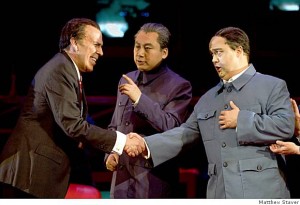[Update Note: Danwei had the photos and some great commentary hours before the article cited below. Good work, and sorry I didn’t see it until now! Great comment thread over there, too.]
This story totally blew me away. I’m not saying I swallowed it hook, line and sinker, just that it made my jaw drop as I wondered how much of this is actually true? The writer is famous and hard to pin down politically (adores Ayn Rand, worked for Ralph Nader, etc.), and he’s obviously no dummy. (Strange, but not necessarily stupid.)
The article has to be seen, because the photos are essential. I do want to quote one section, however, that echoes my immediate reaction upon hearing of China’s “harassment” of the US Navy’s Impeccable.
Imagine if Chinese military vessels appeared 75 miles off the coast of, say, southern California, for the quite obvious purpose of tracking our submarine defenses and conducting surveillance of our San Diego naval base. It would be bombs away, pronto, and no questions asked. However, the Chinese penumbra of sovereignty is apparently more restricted.
Beijing claims U.S. actions violate the UN Law of the Sea, a treaty to which they are signatory and the U.S. is not. However, in contesting this assertion – which came up in the aftermath of the last Hainan incident – U.S. officials routinely note that the UN law, while granting China sovereignty over its “exclusive economic zone,” would have been violated only if the Impeccable was on a commercial expedition, and yet the clear concern on the part of the Chinese is that this was a military mission.
We have our Monroe Doctrine, which was specifically aimed at the crowned heads of Europe, who, in our nation’s youth, posed a threat on our very borders. (This same doctrine, ironically, was later tweaked and twisted into a rationale for our own imperial ambitions in South and Central America, as well as Mexico.) Other nations, however, are not entitled to a Monroe Doctrine of their own: China, Russia, and Iran have no corresponding prerogative to their own spheres of influence, as granted by geography, tradition, and the military necessities of a credible defense.
This made me think of an incident n the 90s when Cuba shot down two cuban exile-owned aircraft dropping anti-government leaflets on the streets of Havana. The planes had taken off from Florida. What would happen, I kept asking myself, if Cuba allowed aircraft to take off to fly over downtown Manhattan dropping anti-US-government leaflets on the sidewalk and all over Central Park?
For the past five years, the group’s volunteer pilots have patrolled the Florida Strait seeking refugees fleeing Cuba on makeshift rafts. In the past, the group’s aircraft reportedly have buzzed the Cuban capital, Havana, to drop leaflets attacking President Fidel Castro.
Castro replied with a warning that any aircraft violating the country’s airspace would be shot down. In Seattle, President Clinton “condemned this action in the strongest possible terms.”
The group, Brothers to the Rescue, had been praised in the US as heroes. And yet if the tables were turned the Monroe Doctrine would be put into play in seconds. We would never stand for it.
Okay, back to China. I realize this could be jumping the gun because I can’t fact-check Raimondo’s article. But looking at his track record I have to say I admire his original thinking and refusal to be slotted. His closing words on China make sense, at least until he gets to that one sentence about the Falun Gong:
There is plenty of anti-Chinese political sentiment in this country, and it’s a constituency that is bipartisan. Among the Democrats, you have organized labor, which is instinctively Sinophobic in this country and always has been, as the history of the oppression of Chinese coolies in California amply demonstrates. The protectionist unions are in a lather about the fact that Chinese workers produce cheaper and better products that American consumers want to buy. In tandem with international do-gooders of every sort, the anti-China popular front also consists of Republicans of the sort who will welcome any fresh enemy, as long as it means more subsidies for the military-industrial-congressional complex. Throw in the wacko cultists of Falun Gong, and what you have is the reincarnation of the old, bipartisan anti-Communist alliance of yesteryear, which brought us wars in Korea and Vietnam – and may yet succeed in provoking a third war on the Asian landmass, one just as futile and unwinnable as its predecessors.
The formulation of American foreign policy is all about domestic political pressures. It is the domain of lobbyists and de facto foreign agents, most of them unregistered, who work with targeted American constituencies to further various commercial and foreign interests. A rational foreign policy, i.e., one that serves authentic American interests, is virtually impossible in these circumstances.
Chas Freeman keeps coming to mind as evidence mounts all around us that we want – demand – to remain in a state of denial and delusion about Israel and China and just about everything else. Maybe it makes us feel safe. We want “analysts” who make us feel like were getting into a warm bath, all snug and safe. Ironically, it is precisely this self-delusional state of mind that landed us in the financial crisis that could well wipe out our dreams and our bankbooks.
Again, go see the photos and read the whole thing. And again, read the Wikipedia entry on the author. Too bad he sounds a bit crazy on why we entered WWII, and in his admiration of Charles Lindbergh. If you can put that aside….

Comments